CNA256 Mental Health: Recovery Principles for Individuals
VerifiedAdded on 2022/09/12
|8
|2334
|36
Essay
AI Summary
This essay, written for CNA256 Mental Health, discusses the significance of recovery principles in mental health care. It explores the historical background of mental health problems and their societal impacts, emphasizing the 'Recovery' approach. The essay covers key aspects of recovery principles, including patient-centered care, self-direction, and the importance of hope and meaningful living for individuals with mental health issues. It also addresses challenges in mental health recovery, such as lack of education, limited resources, and the need for effective recovery plans. The analysis concludes that recovery principles are crucial for reducing mental health problems, improving patient wellbeing, and promoting effective healthcare services. The essay highlights the importance of awareness and education regarding mental health disorders and the implementation of recovery ideologies.
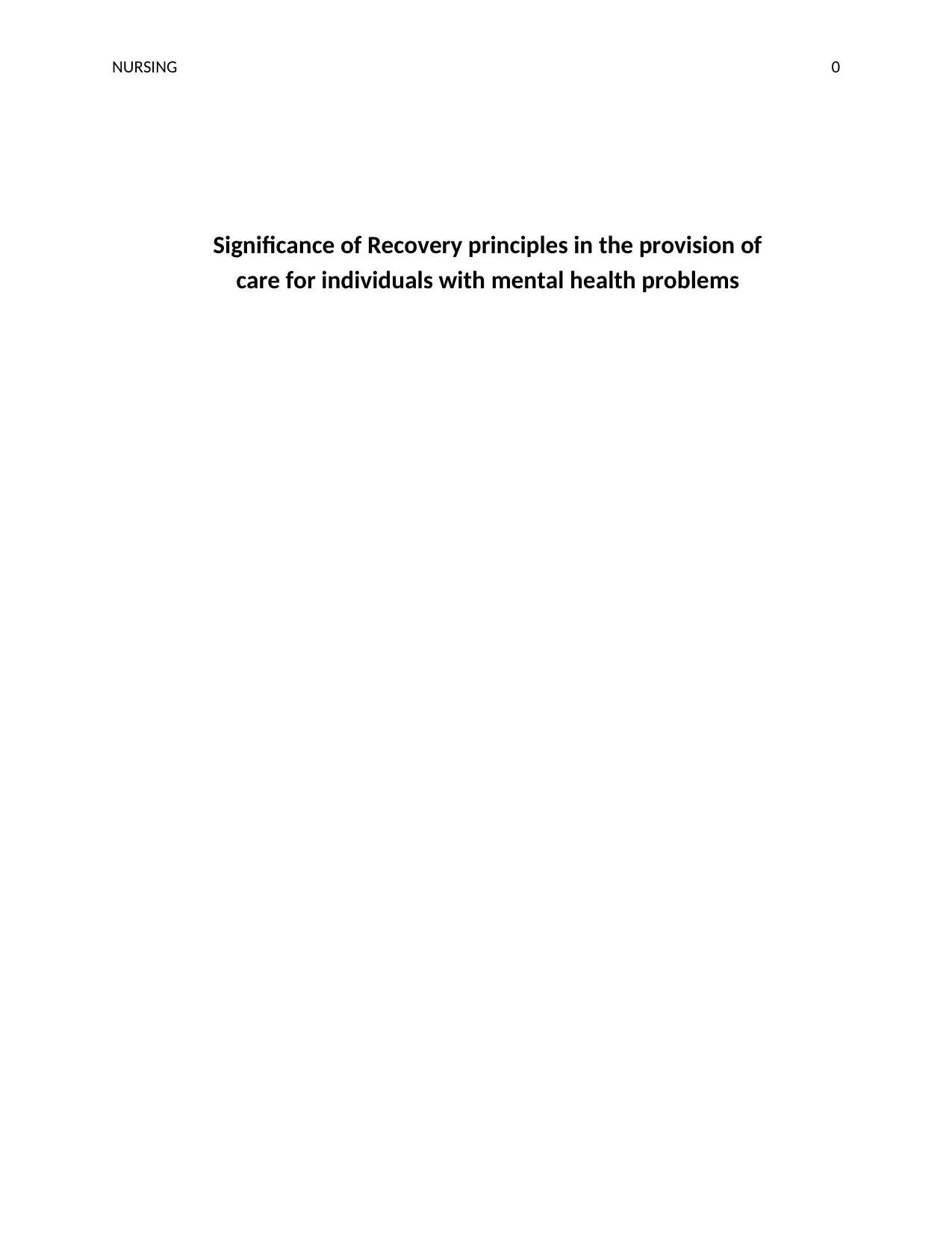
NURSING 0
Significance of Recovery principles in the provision of
care for individuals with mental health problems
Significance of Recovery principles in the provision of
care for individuals with mental health problems
Paraphrase This Document
Need a fresh take? Get an instant paraphrase of this document with our AI Paraphraser
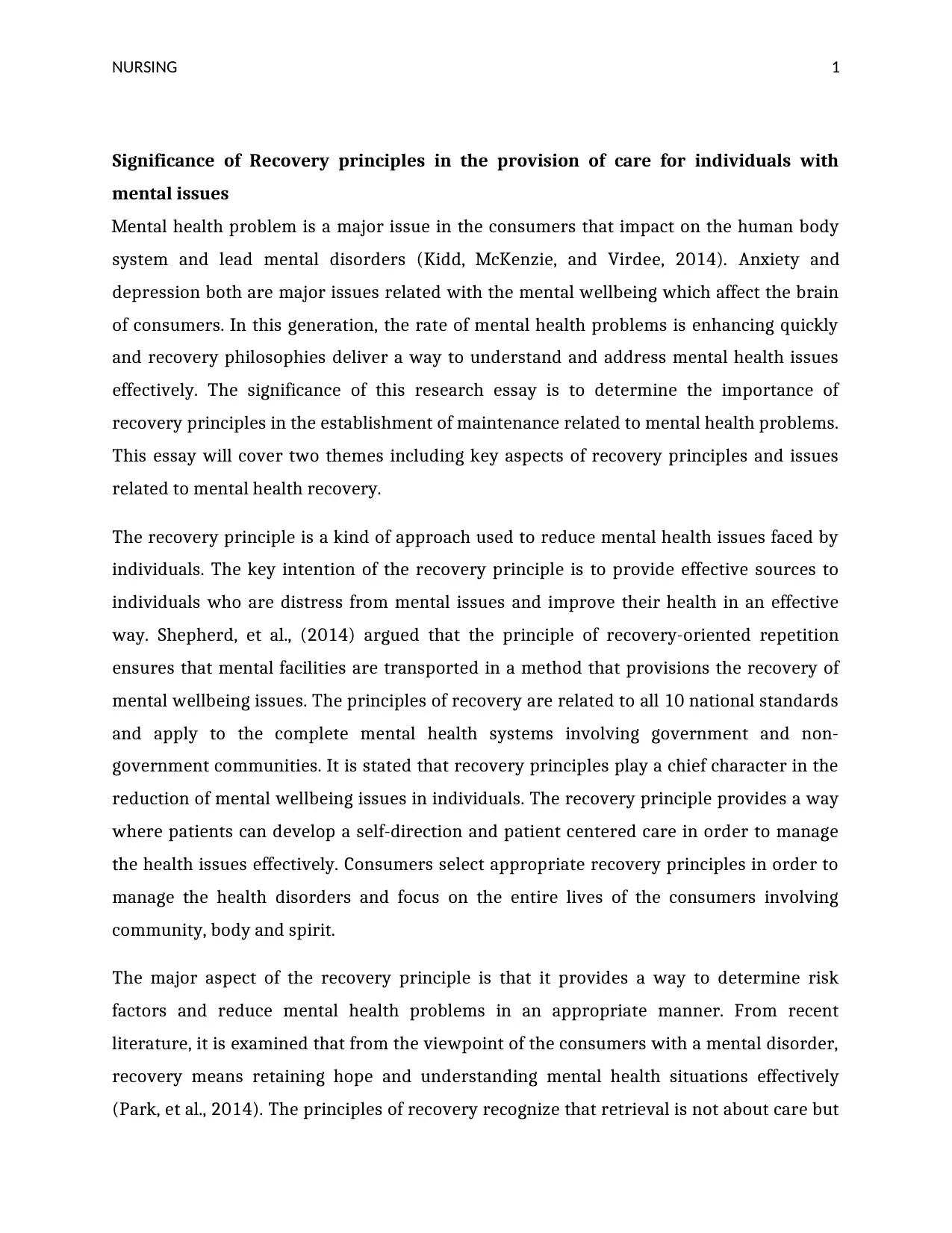
NURSING 1
Significance of Recovery principles in the provision of care for individuals with
mental issues
Mental health problem is a major issue in the consumers that impact on the human body
system and lead mental disorders (Kidd, McKenzie, and Virdee, 2014). Anxiety and
depression both are major issues related with the mental wellbeing which affect the brain
of consumers. In this generation, the rate of mental health problems is enhancing quickly
and recovery philosophies deliver a way to understand and address mental health issues
effectively. The significance of this research essay is to determine the importance of
recovery principles in the establishment of maintenance related to mental health problems.
This essay will cover two themes including key aspects of recovery principles and issues
related to mental health recovery.
The recovery principle is a kind of approach used to reduce mental health issues faced by
individuals. The key intention of the recovery principle is to provide effective sources to
individuals who are distress from mental issues and improve their health in an effective
way. Shepherd, et al., (2014) argued that the principle of recovery-oriented repetition
ensures that mental facilities are transported in a method that provisions the recovery of
mental wellbeing issues. The principles of recovery are related to all 10 national standards
and apply to the complete mental health systems involving government and non-
government communities. It is stated that recovery principles play a chief character in the
reduction of mental wellbeing issues in individuals. The recovery principle provides a way
where patients can develop a self-direction and patient centered care in order to manage
the health issues effectively. Consumers select appropriate recovery principles in order to
manage the health disorders and focus on the entire lives of the consumers involving
community, body and spirit.
The major aspect of the recovery principle is that it provides a way to determine risk
factors and reduce mental health problems in an appropriate manner. From recent
literature, it is examined that from the viewpoint of the consumers with a mental disorder,
recovery means retaining hope and understanding mental health situations effectively
(Park, et al., 2014). The principles of recovery recognize that retrieval is not about care but
Significance of Recovery principles in the provision of care for individuals with
mental issues
Mental health problem is a major issue in the consumers that impact on the human body
system and lead mental disorders (Kidd, McKenzie, and Virdee, 2014). Anxiety and
depression both are major issues related with the mental wellbeing which affect the brain
of consumers. In this generation, the rate of mental health problems is enhancing quickly
and recovery philosophies deliver a way to understand and address mental health issues
effectively. The significance of this research essay is to determine the importance of
recovery principles in the establishment of maintenance related to mental health problems.
This essay will cover two themes including key aspects of recovery principles and issues
related to mental health recovery.
The recovery principle is a kind of approach used to reduce mental health issues faced by
individuals. The key intention of the recovery principle is to provide effective sources to
individuals who are distress from mental issues and improve their health in an effective
way. Shepherd, et al., (2014) argued that the principle of recovery-oriented repetition
ensures that mental facilities are transported in a method that provisions the recovery of
mental wellbeing issues. The principles of recovery are related to all 10 national standards
and apply to the complete mental health systems involving government and non-
government communities. It is stated that recovery principles play a chief character in the
reduction of mental wellbeing issues in individuals. The recovery principle provides a way
where patients can develop a self-direction and patient centered care in order to manage
the health issues effectively. Consumers select appropriate recovery principles in order to
manage the health disorders and focus on the entire lives of the consumers involving
community, body and spirit.
The major aspect of the recovery principle is that it provides a way to determine risk
factors and reduce mental health problems in an appropriate manner. From recent
literature, it is examined that from the viewpoint of the consumers with a mental disorder,
recovery means retaining hope and understanding mental health situations effectively
(Park, et al., 2014). The principles of recovery recognize that retrieval is not about care but
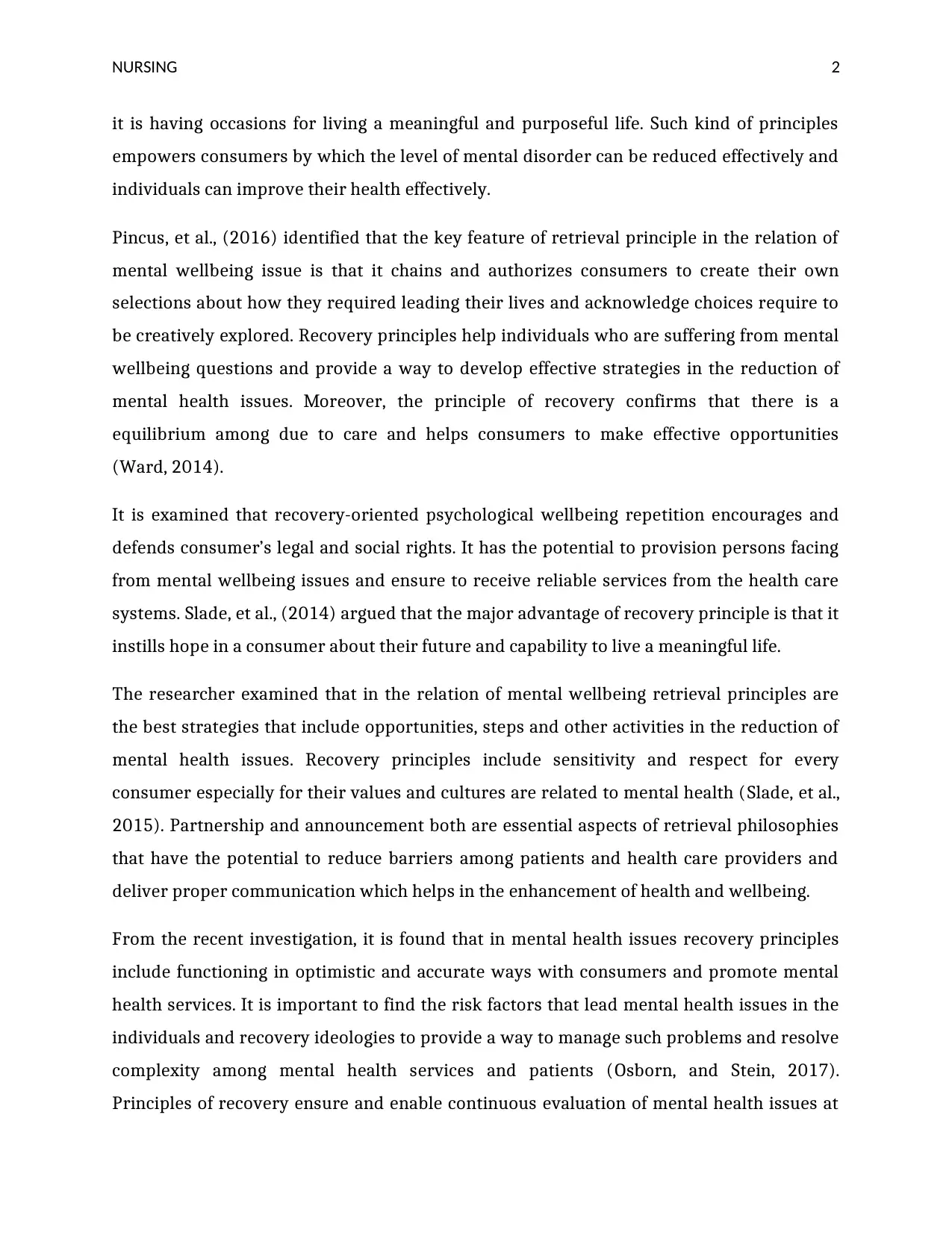
NURSING 2
it is having occasions for living a meaningful and purposeful life. Such kind of principles
empowers consumers by which the level of mental disorder can be reduced effectively and
individuals can improve their health effectively.
Pincus, et al., (2016) identified that the key feature of retrieval principle in the relation of
mental wellbeing issue is that it chains and authorizes consumers to create their own
selections about how they required leading their lives and acknowledge choices require to
be creatively explored. Recovery principles help individuals who are suffering from mental
wellbeing questions and provide a way to develop effective strategies in the reduction of
mental health issues. Moreover, the principle of recovery confirms that there is a
equilibrium among due to care and helps consumers to make effective opportunities
(Ward, 2014).
It is examined that recovery-oriented psychological wellbeing repetition encourages and
defends consumer’s legal and social rights. It has the potential to provision persons facing
from mental wellbeing issues and ensure to receive reliable services from the health care
systems. Slade, et al., (2014) argued that the major advantage of recovery principle is that it
instills hope in a consumer about their future and capability to live a meaningful life.
The researcher examined that in the relation of mental wellbeing retrieval principles are
the best strategies that include opportunities, steps and other activities in the reduction of
mental health issues. Recovery principles include sensitivity and respect for every
consumer especially for their values and cultures are related to mental health (Slade, et al.,
2015). Partnership and announcement both are essential aspects of retrieval philosophies
that have the potential to reduce barriers among patients and health care providers and
deliver proper communication which helps in the enhancement of health and wellbeing.
From the recent investigation, it is found that in mental health issues recovery principles
include functioning in optimistic and accurate ways with consumers and promote mental
health services. It is important to find the risk factors that lead mental health issues in the
individuals and recovery ideologies to provide a way to manage such problems and resolve
complexity among mental health services and patients (Osborn, and Stein, 2017).
Principles of recovery ensure and enable continuous evaluation of mental health issues at
it is having occasions for living a meaningful and purposeful life. Such kind of principles
empowers consumers by which the level of mental disorder can be reduced effectively and
individuals can improve their health effectively.
Pincus, et al., (2016) identified that the key feature of retrieval principle in the relation of
mental wellbeing issue is that it chains and authorizes consumers to create their own
selections about how they required leading their lives and acknowledge choices require to
be creatively explored. Recovery principles help individuals who are suffering from mental
wellbeing questions and provide a way to develop effective strategies in the reduction of
mental health issues. Moreover, the principle of recovery confirms that there is a
equilibrium among due to care and helps consumers to make effective opportunities
(Ward, 2014).
It is examined that recovery-oriented psychological wellbeing repetition encourages and
defends consumer’s legal and social rights. It has the potential to provision persons facing
from mental wellbeing issues and ensure to receive reliable services from the health care
systems. Slade, et al., (2014) argued that the major advantage of recovery principle is that it
instills hope in a consumer about their future and capability to live a meaningful life.
The researcher examined that in the relation of mental wellbeing retrieval principles are
the best strategies that include opportunities, steps and other activities in the reduction of
mental health issues. Recovery principles include sensitivity and respect for every
consumer especially for their values and cultures are related to mental health (Slade, et al.,
2015). Partnership and announcement both are essential aspects of retrieval philosophies
that have the potential to reduce barriers among patients and health care providers and
deliver proper communication which helps in the enhancement of health and wellbeing.
From the recent investigation, it is found that in mental health issues recovery principles
include functioning in optimistic and accurate ways with consumers and promote mental
health services. It is important to find the risk factors that lead mental health issues in the
individuals and recovery ideologies to provide a way to manage such problems and resolve
complexity among mental health services and patients (Osborn, and Stein, 2017).
Principles of recovery ensure and enable continuous evaluation of mental health issues at
⊘ This is a preview!⊘
Do you want full access?
Subscribe today to unlock all pages.

Trusted by 1+ million students worldwide
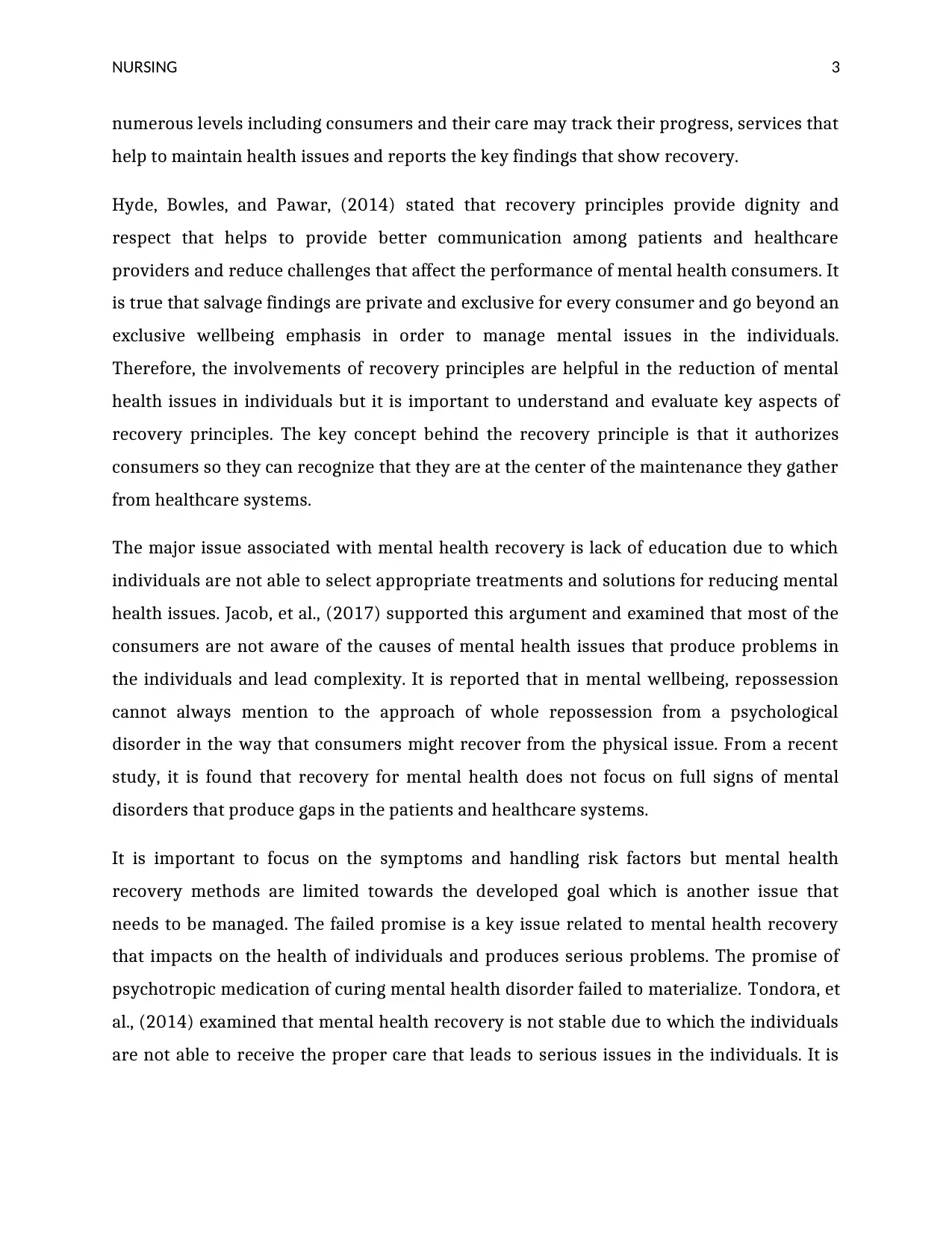
NURSING 3
numerous levels including consumers and their care may track their progress, services that
help to maintain health issues and reports the key findings that show recovery.
Hyde, Bowles, and Pawar, (2014) stated that recovery principles provide dignity and
respect that helps to provide better communication among patients and healthcare
providers and reduce challenges that affect the performance of mental health consumers. It
is true that salvage findings are private and exclusive for every consumer and go beyond an
exclusive wellbeing emphasis in order to manage mental issues in the individuals.
Therefore, the involvements of recovery principles are helpful in the reduction of mental
health issues in individuals but it is important to understand and evaluate key aspects of
recovery principles. The key concept behind the recovery principle is that it authorizes
consumers so they can recognize that they are at the center of the maintenance they gather
from healthcare systems.
The major issue associated with mental health recovery is lack of education due to which
individuals are not able to select appropriate treatments and solutions for reducing mental
health issues. Jacob, et al., (2017) supported this argument and examined that most of the
consumers are not aware of the causes of mental health issues that produce problems in
the individuals and lead complexity. It is reported that in mental wellbeing, repossession
cannot always mention to the approach of whole repossession from a psychological
disorder in the way that consumers might recover from the physical issue. From a recent
study, it is found that recovery for mental health does not focus on full signs of mental
disorders that produce gaps in the patients and healthcare systems.
It is important to focus on the symptoms and handling risk factors but mental health
recovery methods are limited towards the developed goal which is another issue that
needs to be managed. The failed promise is a key issue related to mental health recovery
that impacts on the health of individuals and produces serious problems. The promise of
psychotropic medication of curing mental health disorder failed to materialize. Tondora, et
al., (2014) examined that mental health recovery is not stable due to which the individuals
are not able to receive the proper care that leads to serious issues in the individuals. It is
numerous levels including consumers and their care may track their progress, services that
help to maintain health issues and reports the key findings that show recovery.
Hyde, Bowles, and Pawar, (2014) stated that recovery principles provide dignity and
respect that helps to provide better communication among patients and healthcare
providers and reduce challenges that affect the performance of mental health consumers. It
is true that salvage findings are private and exclusive for every consumer and go beyond an
exclusive wellbeing emphasis in order to manage mental issues in the individuals.
Therefore, the involvements of recovery principles are helpful in the reduction of mental
health issues in individuals but it is important to understand and evaluate key aspects of
recovery principles. The key concept behind the recovery principle is that it authorizes
consumers so they can recognize that they are at the center of the maintenance they gather
from healthcare systems.
The major issue associated with mental health recovery is lack of education due to which
individuals are not able to select appropriate treatments and solutions for reducing mental
health issues. Jacob, et al., (2017) supported this argument and examined that most of the
consumers are not aware of the causes of mental health issues that produce problems in
the individuals and lead complexity. It is reported that in mental wellbeing, repossession
cannot always mention to the approach of whole repossession from a psychological
disorder in the way that consumers might recover from the physical issue. From a recent
study, it is found that recovery for mental health does not focus on full signs of mental
disorders that produce gaps in the patients and healthcare systems.
It is important to focus on the symptoms and handling risk factors but mental health
recovery methods are limited towards the developed goal which is another issue that
needs to be managed. The failed promise is a key issue related to mental health recovery
that impacts on the health of individuals and produces serious problems. The promise of
psychotropic medication of curing mental health disorder failed to materialize. Tondora, et
al., (2014) examined that mental health recovery is not stable due to which the individuals
are not able to receive the proper care that leads to serious issues in the individuals. It is
Paraphrase This Document
Need a fresh take? Get an instant paraphrase of this document with our AI Paraphraser
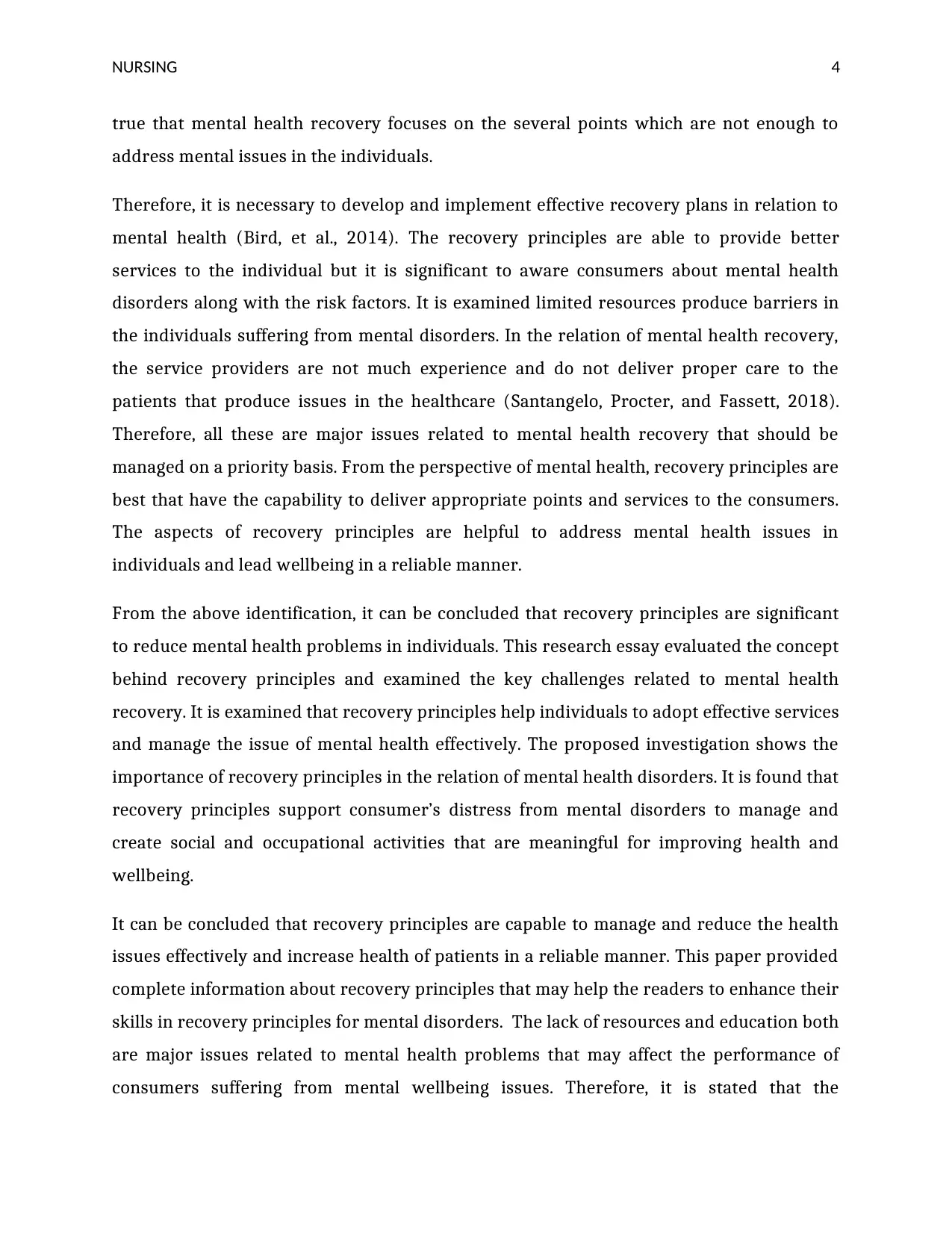
NURSING 4
true that mental health recovery focuses on the several points which are not enough to
address mental issues in the individuals.
Therefore, it is necessary to develop and implement effective recovery plans in relation to
mental health (Bird, et al., 2014). The recovery principles are able to provide better
services to the individual but it is significant to aware consumers about mental health
disorders along with the risk factors. It is examined limited resources produce barriers in
the individuals suffering from mental disorders. In the relation of mental health recovery,
the service providers are not much experience and do not deliver proper care to the
patients that produce issues in the healthcare (Santangelo, Procter, and Fassett, 2018).
Therefore, all these are major issues related to mental health recovery that should be
managed on a priority basis. From the perspective of mental health, recovery principles are
best that have the capability to deliver appropriate points and services to the consumers.
The aspects of recovery principles are helpful to address mental health issues in
individuals and lead wellbeing in a reliable manner.
From the above identification, it can be concluded that recovery principles are significant
to reduce mental health problems in individuals. This research essay evaluated the concept
behind recovery principles and examined the key challenges related to mental health
recovery. It is examined that recovery principles help individuals to adopt effective services
and manage the issue of mental health effectively. The proposed investigation shows the
importance of recovery principles in the relation of mental health disorders. It is found that
recovery principles support consumer’s distress from mental disorders to manage and
create social and occupational activities that are meaningful for improving health and
wellbeing.
It can be concluded that recovery principles are capable to manage and reduce the health
issues effectively and increase health of patients in a reliable manner. This paper provided
complete information about recovery principles that may help the readers to enhance their
skills in recovery principles for mental disorders. The lack of resources and education both
are major issues related to mental health problems that may affect the performance of
consumers suffering from mental wellbeing issues. Therefore, it is stated that the
true that mental health recovery focuses on the several points which are not enough to
address mental issues in the individuals.
Therefore, it is necessary to develop and implement effective recovery plans in relation to
mental health (Bird, et al., 2014). The recovery principles are able to provide better
services to the individual but it is significant to aware consumers about mental health
disorders along with the risk factors. It is examined limited resources produce barriers in
the individuals suffering from mental disorders. In the relation of mental health recovery,
the service providers are not much experience and do not deliver proper care to the
patients that produce issues in the healthcare (Santangelo, Procter, and Fassett, 2018).
Therefore, all these are major issues related to mental health recovery that should be
managed on a priority basis. From the perspective of mental health, recovery principles are
best that have the capability to deliver appropriate points and services to the consumers.
The aspects of recovery principles are helpful to address mental health issues in
individuals and lead wellbeing in a reliable manner.
From the above identification, it can be concluded that recovery principles are significant
to reduce mental health problems in individuals. This research essay evaluated the concept
behind recovery principles and examined the key challenges related to mental health
recovery. It is examined that recovery principles help individuals to adopt effective services
and manage the issue of mental health effectively. The proposed investigation shows the
importance of recovery principles in the relation of mental health disorders. It is found that
recovery principles support consumer’s distress from mental disorders to manage and
create social and occupational activities that are meaningful for improving health and
wellbeing.
It can be concluded that recovery principles are capable to manage and reduce the health
issues effectively and increase health of patients in a reliable manner. This paper provided
complete information about recovery principles that may help the readers to enhance their
skills in recovery principles for mental disorders. The lack of resources and education both
are major issues related to mental health problems that may affect the performance of
consumers suffering from mental wellbeing issues. Therefore, it is stated that the

NURSING 5
implementation of recovery ideologies is the best approach to the reduction of mental
health issues in individuals and lead wellbeing effectively.
implementation of recovery ideologies is the best approach to the reduction of mental
health issues in individuals and lead wellbeing effectively.
⊘ This is a preview!⊘
Do you want full access?
Subscribe today to unlock all pages.

Trusted by 1+ million students worldwide
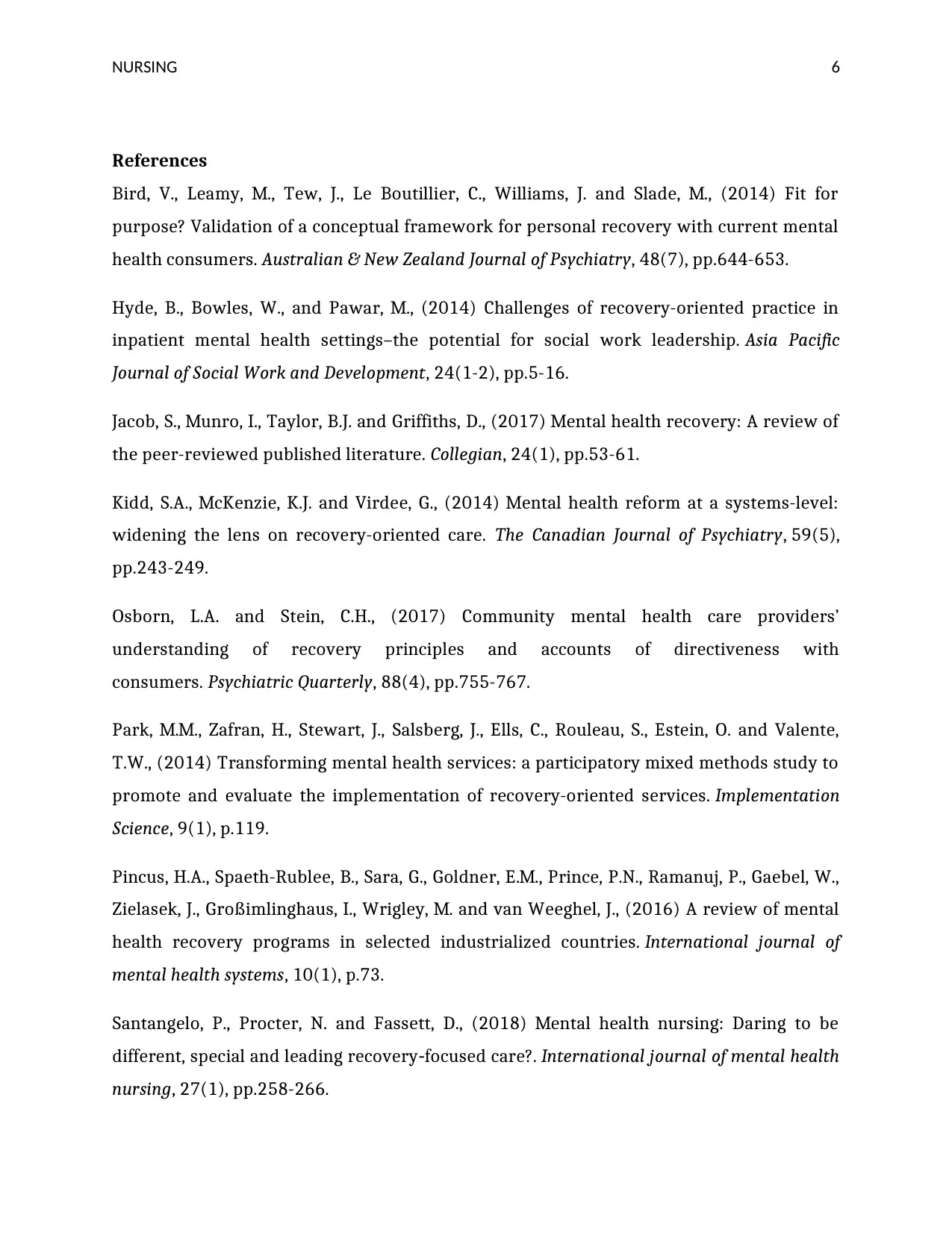
NURSING 6
References
Bird, V., Leamy, M., Tew, J., Le Boutillier, C., Williams, J. and Slade, M., (2014) Fit for
purpose? Validation of a conceptual framework for personal recovery with current mental
health consumers. Australian & New Zealand Journal of Psychiatry, 48(7), pp.644-653.
Hyde, B., Bowles, W., and Pawar, M., (2014) Challenges of recovery-oriented practice in
inpatient mental health settings–the potential for social work leadership. Asia Pacific
Journal of Social Work and Development, 24(1-2), pp.5-16.
Jacob, S., Munro, I., Taylor, B.J. and Griffiths, D., (2017) Mental health recovery: A review of
the peer-reviewed published literature. Collegian, 24(1), pp.53-61.
Kidd, S.A., McKenzie, K.J. and Virdee, G., (2014) Mental health reform at a systems-level:
widening the lens on recovery-oriented care. The Canadian Journal of Psychiatry, 59(5),
pp.243-249.
Osborn, L.A. and Stein, C.H., (2017) Community mental health care providers’
understanding of recovery principles and accounts of directiveness with
consumers. Psychiatric Quarterly, 88(4), pp.755-767.
Park, M.M., Zafran, H., Stewart, J., Salsberg, J., Ells, C., Rouleau, S., Estein, O. and Valente,
T.W., (2014) Transforming mental health services: a participatory mixed methods study to
promote and evaluate the implementation of recovery-oriented services. Implementation
Science, 9(1), p.119.
Pincus, H.A., Spaeth-Rublee, B., Sara, G., Goldner, E.M., Prince, P.N., Ramanuj, P., Gaebel, W.,
Zielasek, J., Großimlinghaus, I., Wrigley, M. and van Weeghel, J., (2016) A review of mental
health recovery programs in selected industrialized countries. International journal of
mental health systems, 10(1), p.73.
Santangelo, P., Procter, N. and Fassett, D., (2018) Mental health nursing: Daring to be
different, special and leading recovery‐focused care?. International journal of mental health
nursing, 27(1), pp.258-266.
References
Bird, V., Leamy, M., Tew, J., Le Boutillier, C., Williams, J. and Slade, M., (2014) Fit for
purpose? Validation of a conceptual framework for personal recovery with current mental
health consumers. Australian & New Zealand Journal of Psychiatry, 48(7), pp.644-653.
Hyde, B., Bowles, W., and Pawar, M., (2014) Challenges of recovery-oriented practice in
inpatient mental health settings–the potential for social work leadership. Asia Pacific
Journal of Social Work and Development, 24(1-2), pp.5-16.
Jacob, S., Munro, I., Taylor, B.J. and Griffiths, D., (2017) Mental health recovery: A review of
the peer-reviewed published literature. Collegian, 24(1), pp.53-61.
Kidd, S.A., McKenzie, K.J. and Virdee, G., (2014) Mental health reform at a systems-level:
widening the lens on recovery-oriented care. The Canadian Journal of Psychiatry, 59(5),
pp.243-249.
Osborn, L.A. and Stein, C.H., (2017) Community mental health care providers’
understanding of recovery principles and accounts of directiveness with
consumers. Psychiatric Quarterly, 88(4), pp.755-767.
Park, M.M., Zafran, H., Stewart, J., Salsberg, J., Ells, C., Rouleau, S., Estein, O. and Valente,
T.W., (2014) Transforming mental health services: a participatory mixed methods study to
promote and evaluate the implementation of recovery-oriented services. Implementation
Science, 9(1), p.119.
Pincus, H.A., Spaeth-Rublee, B., Sara, G., Goldner, E.M., Prince, P.N., Ramanuj, P., Gaebel, W.,
Zielasek, J., Großimlinghaus, I., Wrigley, M. and van Weeghel, J., (2016) A review of mental
health recovery programs in selected industrialized countries. International journal of
mental health systems, 10(1), p.73.
Santangelo, P., Procter, N. and Fassett, D., (2018) Mental health nursing: Daring to be
different, special and leading recovery‐focused care?. International journal of mental health
nursing, 27(1), pp.258-266.
Paraphrase This Document
Need a fresh take? Get an instant paraphrase of this document with our AI Paraphraser
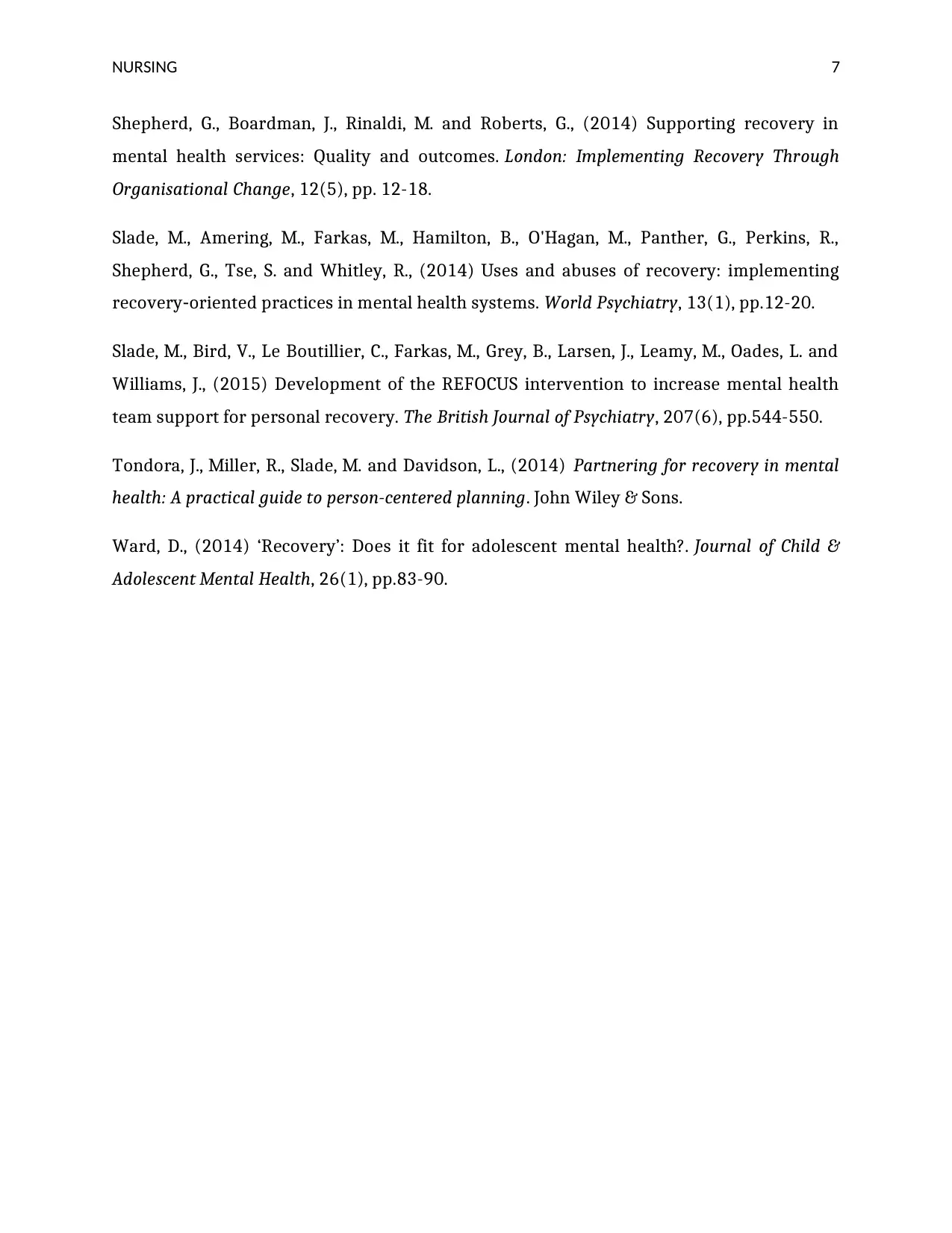
NURSING 7
Shepherd, G., Boardman, J., Rinaldi, M. and Roberts, G., (2014) Supporting recovery in
mental health services: Quality and outcomes. London: Implementing Recovery Through
Organisational Change, 12(5), pp. 12-18.
Slade, M., Amering, M., Farkas, M., Hamilton, B., O'Hagan, M., Panther, G., Perkins, R.,
Shepherd, G., Tse, S. and Whitley, R., (2014) Uses and abuses of recovery: implementing
recovery‐oriented practices in mental health systems. World Psychiatry, 13(1), pp.12-20.
Slade, M., Bird, V., Le Boutillier, C., Farkas, M., Grey, B., Larsen, J., Leamy, M., Oades, L. and
Williams, J., (2015) Development of the REFOCUS intervention to increase mental health
team support for personal recovery. The British Journal of Psychiatry, 207(6), pp.544-550.
Tondora, J., Miller, R., Slade, M. and Davidson, L., (2014) Partnering for recovery in mental
health: A practical guide to person-centered planning. John Wiley & Sons.
Ward, D., (2014) ‘Recovery’: Does it fit for adolescent mental health?. Journal of Child &
Adolescent Mental Health, 26(1), pp.83-90.
Shepherd, G., Boardman, J., Rinaldi, M. and Roberts, G., (2014) Supporting recovery in
mental health services: Quality and outcomes. London: Implementing Recovery Through
Organisational Change, 12(5), pp. 12-18.
Slade, M., Amering, M., Farkas, M., Hamilton, B., O'Hagan, M., Panther, G., Perkins, R.,
Shepherd, G., Tse, S. and Whitley, R., (2014) Uses and abuses of recovery: implementing
recovery‐oriented practices in mental health systems. World Psychiatry, 13(1), pp.12-20.
Slade, M., Bird, V., Le Boutillier, C., Farkas, M., Grey, B., Larsen, J., Leamy, M., Oades, L. and
Williams, J., (2015) Development of the REFOCUS intervention to increase mental health
team support for personal recovery. The British Journal of Psychiatry, 207(6), pp.544-550.
Tondora, J., Miller, R., Slade, M. and Davidson, L., (2014) Partnering for recovery in mental
health: A practical guide to person-centered planning. John Wiley & Sons.
Ward, D., (2014) ‘Recovery’: Does it fit for adolescent mental health?. Journal of Child &
Adolescent Mental Health, 26(1), pp.83-90.
1 out of 8
Related Documents
Your All-in-One AI-Powered Toolkit for Academic Success.
+13062052269
info@desklib.com
Available 24*7 on WhatsApp / Email
![[object Object]](/_next/static/media/star-bottom.7253800d.svg)
Unlock your academic potential
Copyright © 2020–2026 A2Z Services. All Rights Reserved. Developed and managed by ZUCOL.





